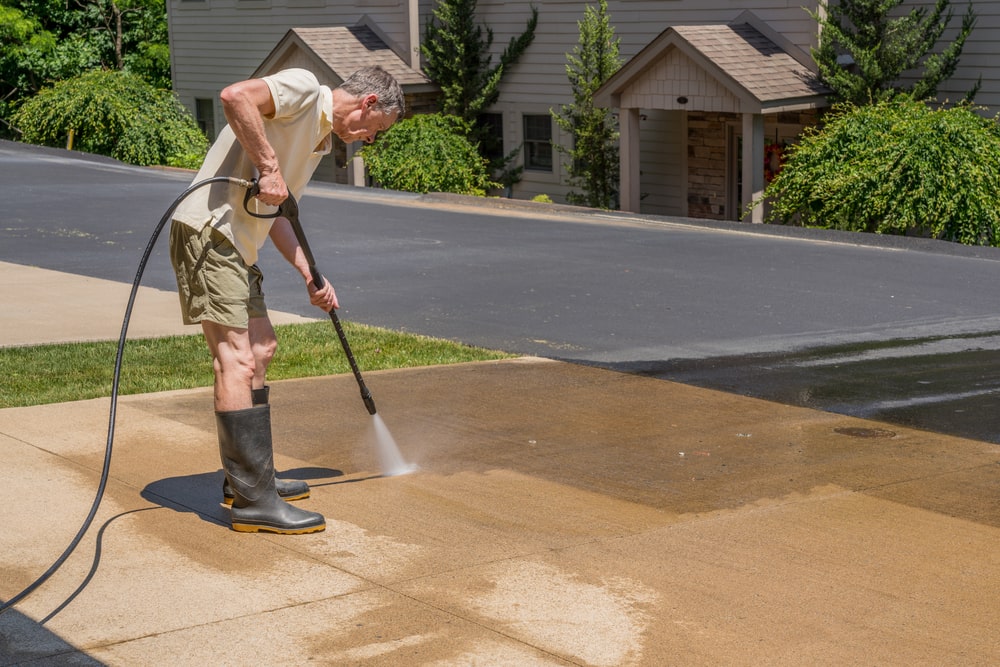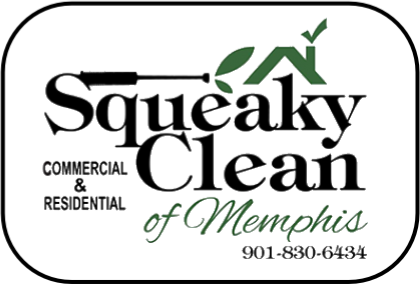
nRemoving tough oil stains from your driveway or patio can be a challenging endeavor. These stains are not only unsightly but can also pose safety risks due to their slippery nature.
Pressure washing is highly effective in tackling stubborn oil stains.
For homeowners in Memphis, using a pressure washer with the right detergent is crucial to achieve a deep clean and restore the appearance of your surfaces.
Understanding Pressure Washing
Pressure washing, also known as power washing, involves the use of high-pressure water spray to remove dirt, grime, and stains. This technique is particularly effective for cleaning hard surfaces such as driveways, patios, and sidewalks, which commonly accumulate tough stains.
By discharging water at a high velocity, pressure washers can penetrate porous surfaces, effectively dislodging embedded oil stains. It is essential to match the appropriate pressure and nozzle type to the surface being cleaned, ensuring both effectiveness and surface integrity are maintained. For homeowners in Memphis, choosing the correct settings and detergent can determine the success of your pressure washing efforts.
Basics of Pressure Washers
Pressure washers use high-pressure water spray to clean surfaces, ideal for removing tough stains.
A pressure washer can output up to 4,000 PSI, removing even the most stubborn grime, especially when paired with high-quality degreasers.
Combining water pressure with the correct nozzle type and detergent enhances cleaning efficiency. Adjustable settings allow customization for various surfaces, ensuring optimal results without damaging property.
Engine-powered variations offer higher power, while electric models are typically more affordable and easier to maintain. Proper usage and safety measures are critical for effective and secure operation.
Benefits of Pressure Washing
Pressure washing is incredibly efficient.
First and foremost, pressure washing saves you time and effort. The high-pressure water stream can reach and clean areas that would be otherwise difficult to access manually, such as cracks and crevices. Additionally, it eliminates the need for strenuous scrubbing, making it an accessible method for cleaning large surfaces quickly and effectively.
This method offers remarkable results.
It’s particularly effective for maintaining curb appeal. Whether cleaning your driveway, deck, or siding, pressure washing removes stains and restores surfaces to their original condition, considerably enhancing the look of your property.
Beyond aesthetics, pressure washing can also prolong the lifespan of outdoor surfaces. By removing contaminants like mold, algae, and dirt, you prevent them from causing long-term damage, thus protecting your investment and saving on potential repair costs in the future.
Safety Precautions
When handling a pressure washer, it’s essential to follow safety guidelines to avoid injury or damage.
- Read the manual: Familiarize yourself with the equipment’s instructions and safety warnings.
- Wear protective gear: Equip yourself with safety goggles, gloves, and non-slip footwear.
- Check for hazards: Inspect the area for any electrical lines or fragile items that could be damaged.
- Monitor water pressure: Ensure the pressure setting is appropriate for the surface being cleaned.
- Maintain distance: Keep the nozzle at a safe distance from the surface and people around.
These steps minimize potential risks associated with high-pressure water streams.
Always ensure the machine is in good working order before starting.
Adhering to these precautions promotes a safe and effective pressure-washing experience.
Protecting Surroundings
Pressure washing can inadvertently damage nearby structures and landscaping if proper precautions are not taken.
Firstly, it’s essential to create a protective barrier to shield sensitive areas such as windows, doors, and wooden decking. Utilize waterproof coverings, plastic sheeting, or drop cloths to prevent water and cleaning solutions from causing harm to these vulnerable sections of your property.
Additionally, consider the impact on your garden by securing protective coverings over shrubs, flowers, and ornamental plants. Direct exposure to high-pressure water can severely damage or even uproot delicate foliage, necessitating the time-consuming task of replanting and potentially costing you added expense.
Lastly, it’s advisable to set up a safety perimeter to guard outdoor furniture and decorative items. Move portable objects indoors or to a safe distance from the work area, and carefully seal immovable fixtures to avoid damaging finishes and surfaces. These proactive measures ensure your surroundings remain intact, contributing to a seamless and efficient pressure washing experience.
Techniques for Removing Oil Stains
To tackle stubborn oil stains, a combination of pre-treatment techniques and pressure washing proves most effective. Applying a degreaser or specialized cleaning solution to the stained area helps to break down the oil molecules, allowing the high-pressure water to more easily wash away the residue. For particularly persistent stains, incorporating a scrub brush to work the solution into the surface can further enhance cleaning efficacy, ensuring a pristine and renewed appearance.
Choosing the Right Detergent
Selecting an appropriate detergent is paramount when tackling tough oil stains, as it directly impacts the cleaning efficacy. A high-quality, oil-specific detergent significantly alters the cleaning outcome.
Different surfaces require different detergents. It’s essential to match the detergent type to your specific surface.
Concrete demands a potent degreaser, whereas treated wood or delicate patios might need a gentler formula.
Brands often offer formulations specifically designed for various stains, including oil and grease, to maximize effectiveness.
Always adhere to manufacturer instructions when diluting and applying detergents, ensuring optimal performance and avoiding potential damage.
Finally, remember to conduct a patch test in an inconspicuous area. This proactive step ensures the detergent’s compatibility with your surface and prevents unwanted reactions.
Optimizing Water Pressure
Properly optimizing water pressure is essential for the effective removal of tough oil stains. Too low, and you won’t achieve the desired outcome; too high, and you risk surface damage.
- Assess the Surface: Determine the type of surface you are cleaning. Concrete can handle higher pressures than wood or delicate surfaces.
- Adjust the PSI: Set your pressure washer’s PSI (pounds per square inch) according to the manufacturer’s guidelines for the specific surface.
- Use Appropriate Nozzles: Select the correct nozzle, typically a 25-degree nozzle for cleaning oil stains, providing a good balance between pressure and coverage.
- Test First: Always test on a small, inconspicuous area to ensure the pressure and nozzle are appropriate, preventing potential surface damage.
These steps ensure the effective removal of oil stains while safeguarding your surfaces.
Remember, always wear appropriate safety gear to protect yourself from high-pressure water streams.
Proper pressure optimization reduces water waste, ensuring your cleaning process is both efficient and eco-friendly.
Post-Cleaning Maintenance
After successfully removing tough oil stains, it is critical to employ preventative measures to maintain the cleanliness and longevity of your surfaces. Regularly inspecting the area for new stains, promptly addressing spills, and applying a sealant can prevent future staining and make ongoing maintenance easier. Additionally, a periodic light pressure wash can help keep the area looking pristine, while ensuring the surface integrity remains intact.
Proper Disposal of Wastewater
Proper disposal of wastewater is crucial for adhering to environmental regulations and protecting local ecosystems. This ensures that harmful contaminants and chemicals do not compromise Memphis’ natural water sources.
Neglecting proper disposal can lead to severe repercussions.
The city of Memphis has specific guidelines to manage wastewater resulting from pressure washing activities. It is vital to follow these regulations to avoid substantial fines and protect water quality.
Homeowners should divert wastewater from entering storm drains by using containment procedures, absorbent barriers, and filtration practices. By doing so, you not only comply with local laws but also contribute to a sustainable and eco-friendly community. For detailed guidelines, refer to the Memphis Environmental Department.
Sealing and Protecting Surfaces
Proper sealing significantly enhances the durability and lifespan of pressure-washed surfaces, preventing future stains.
Sealing creates a protective barrier against oil and debris infiltration.
This barrier keeps surfaces like driveways, patios, and walkways resistant to damage, which not only maintains their appearance but also reduces maintenance costs. By using high-quality sealants, you can ensure that your surfaces remain robust and easy to clean.
It’s advisable to periodically reseal surfaces to ensure long-term protection. This practice is particularly important in Memphis due to varied weather conditions that can lead to the surface’s wear and tear. For professional-grade results, consult a reputable service provider or refer to trusted resources for advice on the best sealing products.
Is it Better to Hire a Professional?
Hiring a professional for pressure washing tough oil stains ensures expertise and efficiency.
Professionals like Squeaky Clean of Memphis, possess advanced tools and strong cleaning solutions.
Their specialized knowledge can handle stubborn stains effectively, minimizing the risk of surface damage, which is crucial for delicate materials.
Moreover, professionals adhere to eco-friendly practices and safety standards, alleviating the homeowner’s concerns about hazardous runoff or improper usage. This peace of mind, combined with a “done right the first time” approach, underscores the value in choosing a professional service.
Conclusion
In conclusion, removing tough oil stains from your driveway, patio, or other hard surfaces can be efficiently accomplished through pressure washing. By understanding the fundamentals of pressure washing, choosing the appropriate equipment and detergent, and following safety and pre-treatment measures, homeowners in Memphis can achieve remarkable results. The preventive maintenance strategies, such as regular inspections, sealing, and proper disposal of wastewater, ensure the longevity and cleanliness of your surfaces.
While DIY pressure washing can be highly effective, hiring a professional service often guarantees optimal outcomes with minimal risk. Professional cleaners possess the expertise, advanced equipment, and eco-friendly practices needed to tackle stubborn stains, offering peace of mind and preserving the integrity of your surfaces.
Ultimately, whether you decide to take on the task yourself or seek professional assistance, pressure washing remains a valuable solution for maintaining the beauty and safety of your outdoor spaces even when it comes to cleaning your homes windows.
